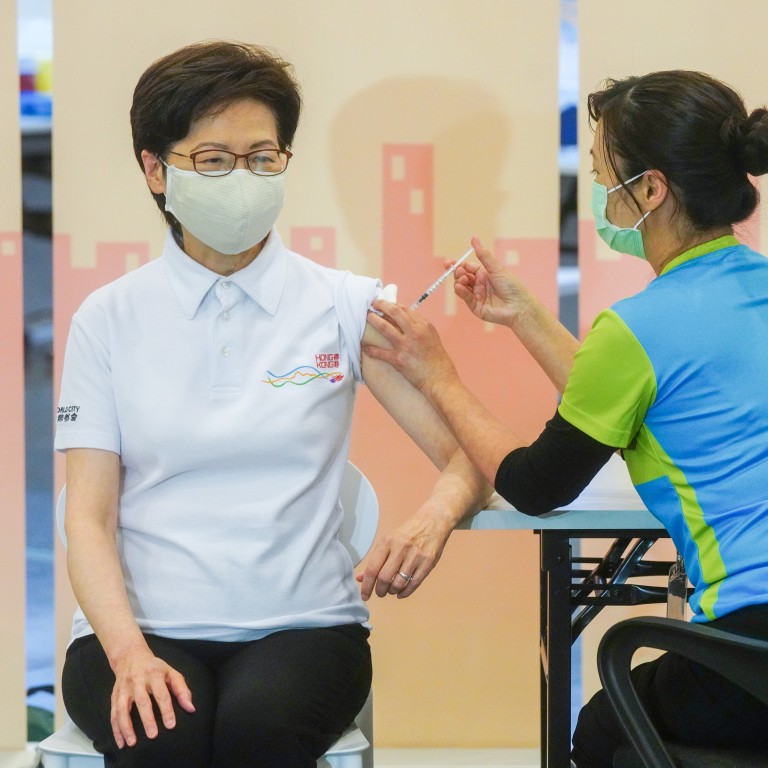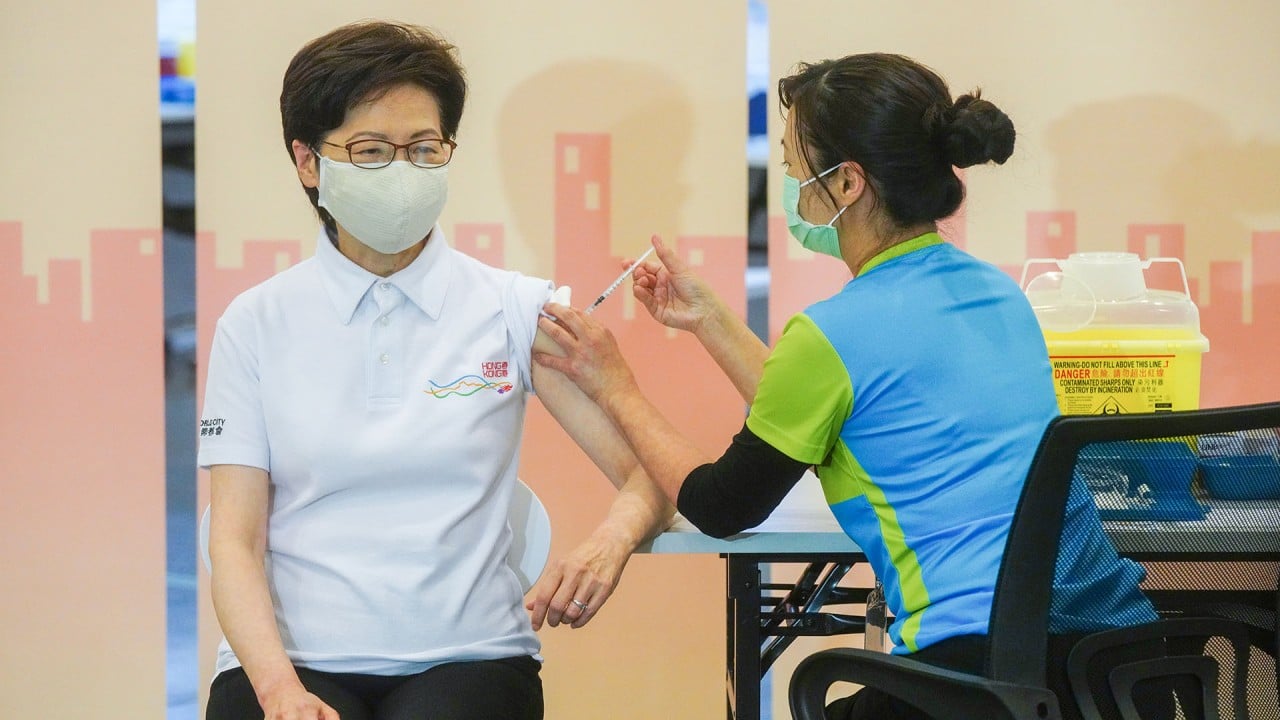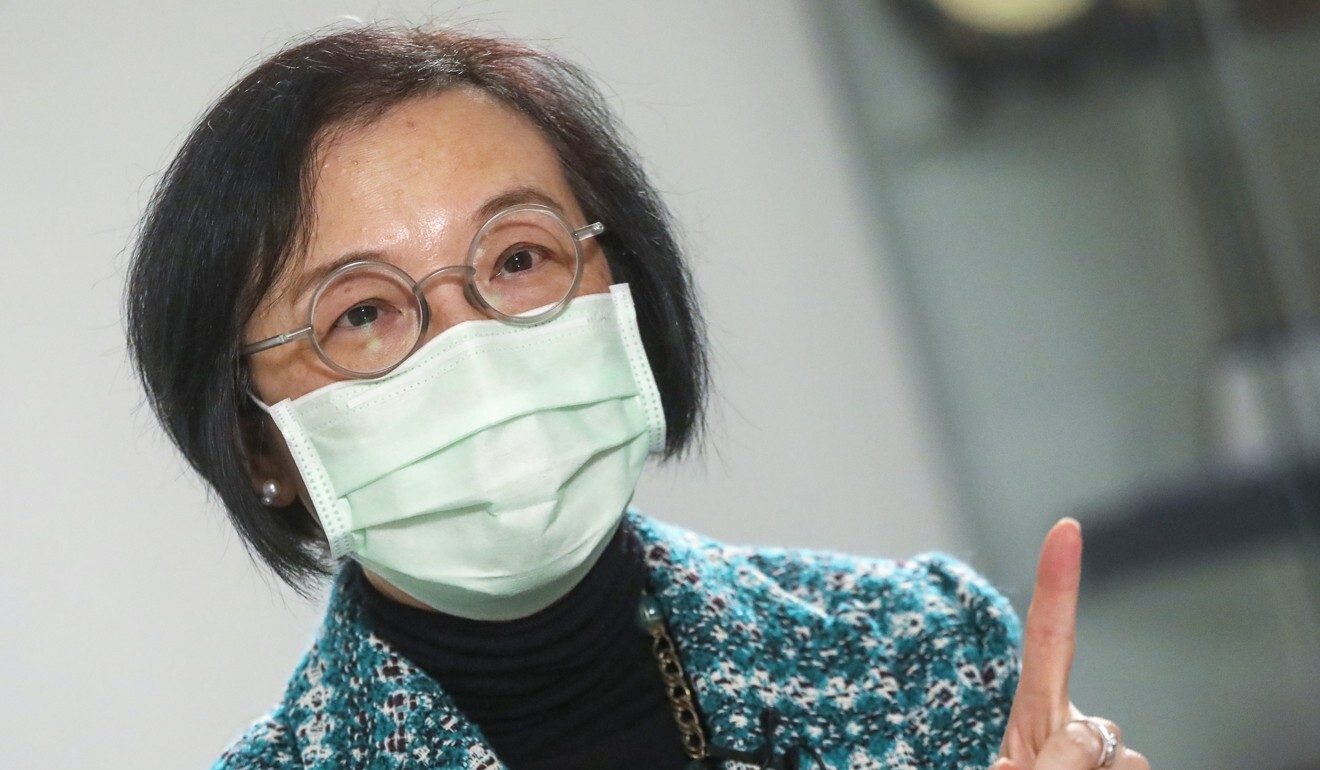
Hong Kong leader Carrie Lam gets city’s first Covid-19 jab, insists only steady fall in cases will lead to further relaxation of social distancing
- Hong Kong leader warns that she does not ‘envisage that within a very short span of time, we will relax social distancing on the basis of vaccination’
- Mass immunisation drive for the city starts later this week, with bookings opening on Tuesday
Hailing the vaccination campaign as a “ray of light” in Hong Kong’s year-long pandemic fight, the city’s chief executive said she was “very happy, very excited” to take the jab and urged the public to also get inoculated.
“The vaccination offers an opportunity and a way out of the current pandemic as soon as possible,” she said.
Health authorities confirmed 16 new infections on Monday, the day before bookings open for the mass immunisation programme which starts later this week.

03:33
Hong Kong Chief Executive Carrie Lam receives city’s first Covid-19 vaccine
But just how much city life could be restored to normality was soon called into question.
“I do not envisage that within a very short span of time, we will relax social distancing on the basis of vaccination, because it would take a pretty lengthy time before vaccination would have its desired effects to protect individuals from being infected, in creating a certain degree of herd immunity in society,” Lam said, when pressed on the issue.
“But if the cases do come down steadily, especially the unlinked local cases, then we may have more basis to relax the measures. But it has nothing to do with vaccination.”
Hong Kong’s contact tracers put up with lies and abuse
Lam was given the mainland-produced Sinovac jab at the community inoculation centre in the Central Library, Causeway Bay, at 2.30pm. Also receiving doses was her No 2 Matthew Cheung Kin-chung, the two ministers in charge of the vaccination roll-out – civil service chief Patrick Nip Tak-kuen and Secretary for Food and Health Professor Sophia Chan Siu-chee – and other principal officials.
They were followed by some Executive Council members and lawmakers, who were given the jabs on a voluntary basis.
Lam previously promised she would get whichever vaccine arrived in the city first.
Launching on Friday, the mass immunisation drive prioritises five groups, including those aged 60 and above and health care workers, as well as residents and staff of care centres for the elderly.
Financial Secretary Paul Chan Mo-po, commerce chief Edward Yau Tang-wah and environment minister Wong Kam-sing were conspicuously absent from the event.
A source said the finance chief was busy with preparing the budget, to be announced on Wednesday, and would take the jab next week.
Earlier, the health minister defended the relaxation of social-distancing rules amid suggestions the government had moved too early.
The city recorded 20 new infections on Sunday, up from a low of eight last Thursday, when social-distancing rules were relaxed following the Lunar New Year holiday.
Monday’s tally dipped again and included four untraceable cases and three imported ones, taking the city’s confirmed caseload to 10,884, including 197 deaths. More than 10 people tested preliminary-positive.
Hongkongers urged to get vaccinated early; city logs 20 new Covid-19 cases
“Over the long holidays, we saw residents had many activities and there were more gatherings, which poses a risk,” Sophia Chan said on Monday.
But Chan dismissed suggestions social-distancing measures had been loosened too early. “Even though we have relaxed the measures, it is conditional, more targeted and gradual,” she told a radio programme.
Taking effect last Thursday, venues such as gyms, beauty parlours and cinemas were allowed to reopen, while restaurants could seat four per table, up from two, and offer dine-in services for an extra four hours until 10pm.
Under the new guidelines, patrons have to leave their information or log their visits on the government’s risk-exposure app at the entrance. Bars remain closed.
But University of Hong Kong microbiologist Dr Ho Pak-leung said the relaxation of rules arrived “a little too soon”, warning it increased the risk of local infections rebounding again.
“If we look back, it was only the three days over the holidays where we had single-digit caseloads. Usually there is less testing over the break,” he told the same radio show.
Hong Kong logs 20 new cases; officials hint reopening border possible if enough residents vaccinated
On Monday, the Department of Health said that every two weeks it would release statistics on the number of people who had suffered adverse reactions once the vaccination drive started. The first statistics can be expected by the middle of March.
Cases of death or serious adverse reactions such as transverse myelitis – inflammation of the spinal cord – or Guillain Barre Syndrome, which attacks the immune system, will be assessed by the expert committee on clinical events assessment following Covid-19 immunisation. The panel is co-chaired by HKU Professor Ivan Hung Fan-ngai and Dr Lee Cheuk-kwong from the Hospital Authority.
If the adverse reactions are proven to be correlated with the vaccine, those affected will be eligible for damages from a specialised government fund.
The committee might also recommend changes based on their findings, which could range from updating the vaccine label and safety statements to revoking authorisation entirely.
Hung also echoed the city’s leader’s cautious approach on social distancing.
“Of course, social-distancing measures could be relaxed a little, but mask-wearing at least I think must continue for the next few years,” he said.
The government also released fact sheets for the public on the two vaccines due to be rolled out shortly.

The document said the Sinovac jab was for people aged 18 and above, but highlighted its “insufficient efficacy evidence” for those aged 60 and above as only 5.1 per cent of its phase-three trial participants outside China were in that elderly age group.
By contrast, the note stated the BioNTech vaccines were for people aged 16 and above, and said they could not “give you Covid-19” as they did not “contain the virus to produce immunity”, relying instead on new mRNA technology.
For Sinovac jabs, the published guideline listed five groups of people not to be given the vaccine, including those with previous severe allergic reactions to vaccine, those with severe neurological conditions, patients with uncontrolled severe chronic diseases as well as pregnant and lactating women.
But for the BioNTech vaccine, the guideline only said it should not be given to those who were allergic to its ingredients.
The fact sheet named 36 possible known side effects for the Sinovac vaccine, including pain around the injection site, headaches and fatigue. Rare adverse reactions listed included nose bleeds, diarrhoea and muscle cramps.
It named 14 for BioNTech, including an up to one in 1,000 chance to experience temporary one-sided facial drooping.

